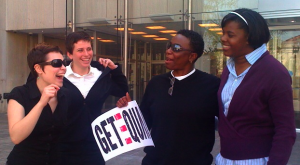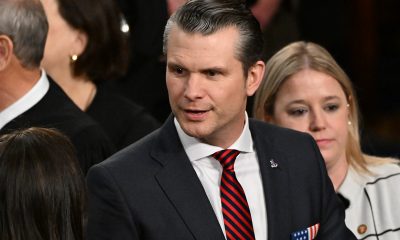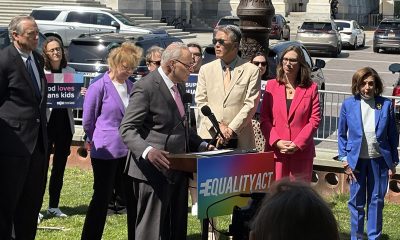National
Charges against ENDA protesters to be dropped
Demonstrators must stay away from Pelosi’s office

Charges filed against (from left) Jay Carmona, Samantha Ames, Chas Kirven and Michelle Wright following a sit-in protest last month in House Speaker Nancy Pelosi’s office will be dropped if they abide by certain conditions. (DC Agenda photo by Chris Johnson)
Charges against Capitol Hill demonstrators who last month targeted House Speaker Nancy Pelosi, accusing her of failing to advance the Employment Non-Discrimination Act, will be dropped provided they abide by certain conditions.
Jay Carmona, Samantha Ames, Chas Kirven and Michelle Wright pleaded not guilty in D.C. Superior Court Tuesday to misdemeanor charges of unlawful entry. They were arrested March 18 following a sit-in protest in Pelosi’s office in the Cannon House Office Building. The group refused to leave despite police orders to do so.
The group demanded that Pelosi move a transgender-inclusive version of ENDA to the House floor by the end of March. The demonstrators said they wanted a vote on the bill — even if it lacked the necessary votes for passage — to best determine where lawmakers stand.
Representing the protesters in court was Claire Morris Clark, an attorney for D.C. law firm Schertler & Onorato.
Clark said the U.S. attorney general’s office would drop the charges if demonstrators met the terms of the agreement by their next scheduled court appearance, Oct. 6.
If the protesters meet the terms of the agreement, Clark said, they wouldn’t have to appear in court. Any violators would be required to make an appearance and potentially face additional penalties.
One term of the agreement is that demonstrators arrested March 18 must stay away from Pelosi’s office in the Cannon House Office Building unless invited in writing. Another term is that the protestors must not be arrested under probable cause before Oct. 6.
Additionally, Clark said the two protesters who are D.C. residents, Carmona and Ames, must complete 60 hours of community service. Clark noted that because Kirven and Wright aren’t D.C. residents, the D.C. government doesn’t have jurisdiction to require them to meet this term of the agreement.
Clark said another term of the agreement is that protesters cannot engage in activity in the U.S. Capitol that the U.S. attorney’s office deems disruptive.
But she noted that Judge Harold Cushenberry said in court he wouldn’t enforce this part of the agreement because he didn’t think the agreement clearly defined what the U.S. attorney’s office might find disruptive.
The protesters who consented to the agreement said they were happy with the outcome of the proceedings.
Ames, a queer D.C. resident, said she’s “actually quite excited” to do the community service assigned to her as part of the agreement. She planned to fill her time with Transgender Health Empowerment in D.C.
Noting that the ENDA protesters who were arrested weren’t transgender, Ames said being arrested as a transgender person is “so much more dangerous.”
“Working for an organization that does community service that is working making that right and working toward making the prisons safer for transgender folks in the area is, I think, something that I should feel fortunate to have the opportunity to do,” she said.
Carmona, a lesbian D.C. resident, called the court agreement “just another step” toward “getting ENDA passed for equality.”
“So, I think I don’t really feel a sense of joy or accomplishment so much as I feel like we just took another step,” she said. “It’s definitely not party time.”
Noting that an early version of ENDA was first introduced in the U.S. House in 1974, Carmona said that LGBT people have been waiting “close to 40 years for basic employment protections, and we’re not going to wait another 40.”
Clark said after the protesters’ court appearance that the agreement was a “very good outcome.”
“The U.S. attorney’s office has a couple different mediums where they’ll try and work things out, and this is the best one,” she said. “It doesn’t require a guilty plea. It’s a very good deal.”
The protesters also expressed satisfaction with the result of their protest. Ames said she thought the protest led to showing sufficient votes exist to pass ENDA, despite claims to the contrary.
As she was being handcuffed at the end of her protest March 18, Ames said a member of Pelosi’s staff asked her if she thought there were enough votes to pass ENDA.
“And I said, ‘Yes,” Ames said. “And she said, ‘We don’t.’ And I said I really wish we could have had this conversation earlier because I would have liked to have this conservation with her.”
Following her arrest, Ames said media reports emerged quoting Rep. Tammy Baldwin (D-Wis.) as saying that enough support existed in the House to pass ENDA.
“So the fact that that was starting the next day — I don’t want to make this about egos, I want to make this about ENDA — but it would seem that it got something accomplished,” she said.
Present in the courtroom Tuesday to show support for the ENDA protesters was Lt. Dan Choi, who was arrested the same day after chaining himself to the White House fence in opposition to “Don’t Ask, Don’t Tell,” and Robin McGehee, co-chair of GetEqual.org, which helped coordinate the protests.
Choi said he wanted to show his support for the ENDA protesters because the shared experience of being arrested following their respective protests is “in a lot of ways, like being in combat.”
“We have waged war against inequality,” he said. “Sometimes, as soldiers, you don’t have a lot of money, you don’t have a lot of trappings of what we have in terms of political power — but we have each other, and until we have full equality, this is a battle that none of us are going to step away from.”
Asked whether further acts of civil disobedience could occur to further LGBT civil rights, Choi replied, “Of course,” and said that he personally plans to take part in such protests.
“Until we have that American promise of equality and access to truth and truthful living manifest to everyone, it has to continue,” he said.
McGehee said GetEqual.org is planning further acts of civil disobedience to push for LGBT civil rights.
“We will be back and we will continue to organize non-violent civil disobedience throughout D.C. and other areas across the United States until we’re equal,” she said.
McGehee declined to offer any details, but said she expects the next such event will occur in D.C. before the end of April.
“Our goal with GetEqual is to create the lunch-counter moments that so clearly defined the civil rights movement around racial justice,” she said. “In an equality movement, we believe that we need to create those images that highlight the injustices that are clearly out there.”
Federal Government
UPenn erases Lia Thomas’s records as part of settlement with White House
University agreed to ban trans women from women’s sports teams

In a settlement with the Trump-Vance administration announced on Tuesday, the University of Pennsylvania will ban transgender athletes from competing and erase swimming records set by transgender former student Lia Thomas.
The U.S. Department of Education’s Office for Civil Rights found the university in violation of Title IX, the federal rights law barring sex based discrimination in educational institutions, by “permitting males to compete in women’s intercollegiate athletics and to occupy women-only intimate facilities.”
The statement issued by University of Pennsylvania President J. Larry Jameson highlighted how the law’s interpretation was changed substantially under President Donald Trump’s second term.
“The Department of Education OCR investigated the participation of one transgender athlete on the women’s swimming team three years ago, during the 2021-2022 swim season,” he wrote. “At that time, Penn was in compliance with NCAA eligibility rules and Title IX as then interpreted.”
Jameson continued, “Penn has always followed — and continues to follow — Title IX and the applicable policy of the NCAA regarding transgender athletes. NCAA eligibility rules changed in February 2025 with Executive Orders 14168 and 14201 and Penn will continue to adhere to these new rules.”
Writing that “we acknowledge that some student-athletes were disadvantaged by these rules” in place while Thomas was allowed to compete, the university president added, “We recognize this and will apologize to those who experienced a competitive disadvantage or experienced anxiety because of the policies in effect at the time.”
“Today’s resolution agreement with UPenn is yet another example of the Trump effect in action,” Education Secretary Linda McMahon said in a statement. “Thanks to the leadership of President Trump, UPenn has agreed both to apologize for its past Title IX violations and to ensure that women’s sports are protected at the university for future generations of female athletes.”
Under former President Joe Biden, the department’s Office of Civil Rights sought to protect against anti-LGBTQ discrimination in education, bringing investigations and enforcement actions in cases where school officials might, for example, require trans students to use restrooms and facilities consistent with their birth sex or fail to respond to peer harassment over their gender identity.
Much of the legal reasoning behind the Biden-Harris administration’s positions extended from the 2020 U.S. Supreme Court case Bostock v. Clayton County, which found that sex-based discrimination includes that which is based on sexual orientation or gender identity under Title VII rules covering employment practices.
The Trump-Vance administration last week put the state of California on notice that its trans athlete policies were, or once were, in violation of Title IX, which comes amid the ongoing battle with Maine over the same issue.
New York
Two teens shot steps from Stonewall Inn after NYC Pride parade
One of the victims remains in critical condition

On Sunday night, following the annual NYC Pride March, two girls were shot in Sheridan Square, feet away from the historic Stonewall Inn.
According to an NYPD report, the two girls, aged 16 and 17, were shot around 10:15 p.m. as Pride festivities began to wind down. The 16-year-old was struck in the head and, according to police sources, is said to be in critical condition, while the 17-year-old was said to be in stable condition.
The Washington Blade confirmed with the NYPD the details from the police reports and learned no arrests had been made as of noon Monday.
The shooting took place in the Greenwich Village neighborhood of Manhattan, mere feet away from the most famous gay bar in the city — if not the world — the Stonewall Inn. Earlier that day, hundreds of thousands of people marched down Christopher Street to celebrate 55 years of LGBTQ people standing up for their rights.
In June 1969, after police raided the Stonewall Inn, members of the LGBTQ community pushed back, sparking what became known as the Stonewall riots. Over the course of two days, LGBTQ New Yorkers protested the discriminatory policing of queer spaces across the city and mobilized to speak out — and throw bottles if need be — at officers attempting to suppress their existence.
The following year, LGBTQ people returned to the Stonewall Inn and marched through the same streets where queer New Yorkers had been arrested, marking the first “Gay Pride March” in history and declaring that LGBTQ people were not going anywhere.
New York State Assemblywoman Deborah Glick, whose district includes Greenwich Village, took to social media to comment on the shooting.
“After decades of peaceful Pride celebrations — this year gun fire and two people shot near the Stonewall Inn is a reminder that gun violence is everywhere,” the lesbian lawmaker said on X. “Guns are a problem despite the NRA BS.”
New York
Zohran Mamdani participates in NYC Pride parade
Mayoral candidate has detailed LGBTQ rights platform

Zohran Mamdani, the candidate for mayor of New York City who pulled a surprise victory in the primary contest last week, walked in the city’s Pride parade on Sunday.
The Democratic Socialist and New York State Assembly member published photos on social media with New York Attorney General Letitia James, telling followers it was “a joy to march in NYC Pride with the people’s champ” and to “see so many friends on this gorgeous day.”
“Happy Pride NYC,” he wrote, adding a rainbow emoji.
Mamdani’s platform includes a detailed plan for LGBTQ people who “across the United States are facing an increasingly hostile political environment.”
His campaign website explains: “New York City must be a refuge for LGBTQIA+ people, but private institutions in our own city have already started capitulating to Trump’s assault on trans rights.
“Meanwhile, the cost of living crisis confronting working class people across the city hits the LGBTQIA+ community particularly hard, with higher rates of unemployment and homelessness than the rest of the city.”
“The Mamdani administration will protect LGBTQIA+ New Yorkers by expanding and protecting gender-affirming care citywide, making NYC an LGBTQIA+ sanctuary city, and creating the Office of LGBTQIA+ Affairs.”




















